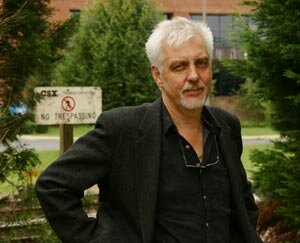Wrong side: Track crossers' pleas denied
They brought pictures. They pleaded ignorance. They asked for a warning– all to no avail.
Thirty-eight people on the Charlottesville General District Court docket August 26 were charged with railroad trespassing. And all who appeared before Judge Robert Downer were found guilty for illegally crossing the CSX tracks, albeit with a $25 fine instead of the usual $35. Throw in court costs, and that shortcut cost $91.
The day before, 21 trespassing-on-the-railroad cases were on the docket, including a well-known pedestrian activist. Stratton Salidis, who chairs a group called Alternatives to Paving, says the large number of track crossers "highlights the need for greater pedestrian facilities."
Although pedestrians are legally allowed to cross the tracks only at raised street crossings, Charlottesvillians have long strolled across the tracks at convenient spots.
Buckingham Branch Railroad, which has been leasing the CSX line that bisects the city, recently asked police to enforce federal and state laws that make it illegal to trespass on railroad property.
By the morning of August 26, Charlottesville police had issued 75 citations in the crackdown, according to Sergeant David Shifflett. Most offenders have been nabbed near the Belmont Bridge.
Alan Addington was the first to plead for lenience. He pointed out the pedestrian crosswalk sign in front of the train tracks near the Belmont Bridge and the lack of a "no trespassing" sign.
Downer seemed sympathetic: "I realize people have need to cross the tracks. You need to go to City Council and ask for a safe crossing," advised the judge, before adding, "I have to enforce the law...Guilty."
"How am I supposed to know?" asked Addington.
"You've heard that adage, 'Ignorance of the law is no excuse'?" asked Downer. (The railroad company has put up several signs, said Downer, and they've all been torn down.)
Goodman Street resident Gregory DeWolf wondered why he wasn't given a warning. Downer said the police couldn't keep track of who'd been given warnings, and again Downer seemed sympathetic, recalling that for many years the law forbidding track crossing around the university was not enforced. "That'll be a $25 fine," he told DeWolf.
James Ford, a former Citizen's Party candidate for the House of Delegates in 1981, used to live in Belmont. Now he resides in Nelson County, but he returned to familiar turf, parking in Belmont August 5 when he came to attend a Fridays After Five concert.
"The legal crossing– the Belmont Bridge– "is hazardous to me," said Ford.
Ford brought pictures of the spot where he was ticketed, and pointed out a nearby pedestrian crosswalk sign as well as the well-worn path leading across the tracks.
"Like cows making a path," observed Downer. "I know," Ford responded. "I have cows in my corn."
And he complained that $101 in fine and court costs was a significant amount of money. Downer pointed out that anyone who came to court saved $10 by getting the $25 fine, rather than the standard $35.
By the time Downer got to the H's on the alphabetical list of names, the track crossers seemed to realize the judge wasn't letting anybody off– even those who pointed out that the western sidewalk of the Belmont Bridge has been closed for repairs.
Kevin Shifflett tried the "this-is-my-first-time" approach. When that didn't fly, he used the "off-duty-cops-do-it-too" defense.
"Well, if they're given a ticket, they'll be treated the same and given a fine," Downer assured him.
To those who looked glum about their guilty verdicts, Downer suggested, "You can take it to Circuit Court to appeal within 10 days."
Alan Addington is going to appeal, and he says the clerk's office told him he was the only one so far.
"I think it's wrong," he declared after his court appearance. His ticket came when he was crossing to his car in Belmont to give a ride home to a friend who has multiple sclerosis, a Good Samaritan act that cost each of them $91.
"It just pissed me off," he says. "It took $91 away from a friend who's on disability."
Addington, like many other citizens, is chafing at the new enforcement of a law that's been tacitly ignored all his life. "I used to walk to school on the train tracks," says Addington. "I'm no stranger to train tracks."
And on October 17, he'll have a chance to tell it to a judge– again.

Scene of the crime: The no-trespassing sign by the tracks has been torn down repeatedly. Alan Addington, who plans to appeal his conviction for illegal train track crossing, says the sign was hanging in a tree the day he got ticketed.
PHOTO BY GEORGE KAMIDE